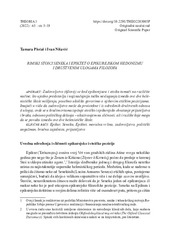Rimski stoici Seneka i Epiktet o epikurejskom hedonizmu i društvenim ulogama filozofa
Roman Stoics Seneca and Epictetus on Epicurean Hedonism and the Social Roles of Philosophers
Чланак у часопису (Објављена верзија)
Метаподаци
Приказ свих података о документуАпстракт
Zadovoljstvo (ἡδονή) se kod epikurejaca i stoika tumači na različite načine, što ujedno predstavlja i najznačajniju tačku neslaganja između ove dve hele nističke škole mišljenja, posebno ukoliko govorimo o njihovim etičkim pozicijama. Imajući u vidu da zadovoljstvo može da proistekne i iz određenih društvenih odnosa (i uloga), ovde se u kraćim crtama ispituje stoičko i epikurejsko shvatanje prijateljstva i braka, odnosno političkog delanja – ukazivanjem na sličnosti, ali i razlike koje mogu da se povuku između ove dve helenističke škole.
Epicureans and Roman Stoics interpreted pleasure (ἡδονή) differently from each
other: for the Epicureans, pleasure was the ultimate good, while most Stoics perceived
pleasure as something indifferent. This difference in understanding of pleasure is the
crucial point of a disagreement between these two Hellenistic schools of philosophy,
in particular if we consider their ethics. This paper examines this difference and highli ghts the significant similarities between the Roman Stoic and the Epicurean positions.
Further, it briefly explores the Epicurean and the Roman Stoic understanding of social
relations and philosophers’ role in politics and society.
Кључне речи:
Epikur / Seneka / Epiktet / moralna vrlina / zadovoljstvo / politički angažman / bračna zajednica / prijateljstvoИзвор:
Theoria, 2022, 65, 3, 5-19Издавач:
- Beograd : Institut za filozofiju i društvenu teoriju
Финансирање / пројекти:
- Министарство науке, технолошког развоја и иновација Републике Србије, институционално финансирање - 200025 (Универзитет у Београду, Институт за филозофију и друштвену теорију) (RS-MESTD-inst-2020-200025)
Колекције
Институција/група
IFDTTY - JOUR AU - Plećaš, Tamara AU - Nišavić, Ivan PY - 2022 UR - http://rifdt.instifdt.bg.ac.rs/123456789/2753 AB - Zadovoljstvo (ἡδονή) se kod epikurejaca i stoika tumači na različite načine, što ujedno predstavlja i najznačajniju tačku neslaganja između ove dve hele nističke škole mišljenja, posebno ukoliko govorimo o njihovim etičkim pozicijama. Imajući u vidu da zadovoljstvo može da proistekne i iz određenih društvenih odnosa (i uloga), ovde se u kraćim crtama ispituje stoičko i epikurejsko shvatanje prijateljstva i braka, odnosno političkog delanja – ukazivanjem na sličnosti, ali i razlike koje mogu da se povuku između ove dve helenističke škole. AB - Epicureans and Roman Stoics interpreted pleasure (ἡδονή) differently from each other: for the Epicureans, pleasure was the ultimate good, while most Stoics perceived pleasure as something indifferent. This difference in understanding of pleasure is the crucial point of a disagreement between these two Hellenistic schools of philosophy, in particular if we consider their ethics. This paper examines this difference and highli ghts the significant similarities between the Roman Stoic and the Epicurean positions. Further, it briefly explores the Epicurean and the Roman Stoic understanding of social relations and philosophers’ role in politics and society. PB - Beograd : Institut za filozofiju i društvenu teoriju T2 - Theoria T1 - Rimski stoici Seneka i Epiktet o epikurejskom hedonizmu i društvenim ulogama filozofa T1 - Roman Stoics Seneca and Epictetus on Epicurean Hedonism and the Social Roles of Philosophers IS - 3 VL - 65 SP - 5 EP - 19 DO - 10.2298/THEO2203005P ER -
@article{
author = "Plećaš, Tamara and Nišavić, Ivan",
year = "2022",
abstract = "Zadovoljstvo (ἡδονή) se kod epikurejaca i stoika tumači na različite načine, što ujedno predstavlja i najznačajniju tačku neslaganja između ove dve hele nističke škole mišljenja, posebno ukoliko govorimo o njihovim etičkim pozicijama. Imajući u vidu da zadovoljstvo može da proistekne i iz određenih društvenih odnosa (i uloga), ovde se u kraćim crtama ispituje stoičko i epikurejsko shvatanje prijateljstva i braka, odnosno političkog delanja – ukazivanjem na sličnosti, ali i razlike koje mogu da se povuku između ove dve helenističke škole., Epicureans and Roman Stoics interpreted pleasure (ἡδονή) differently from each
other: for the Epicureans, pleasure was the ultimate good, while most Stoics perceived
pleasure as something indifferent. This difference in understanding of pleasure is the
crucial point of a disagreement between these two Hellenistic schools of philosophy,
in particular if we consider their ethics. This paper examines this difference and highli ghts the significant similarities between the Roman Stoic and the Epicurean positions.
Further, it briefly explores the Epicurean and the Roman Stoic understanding of social
relations and philosophers’ role in politics and society.",
publisher = "Beograd : Institut za filozofiju i društvenu teoriju",
journal = "Theoria",
title = "Rimski stoici Seneka i Epiktet o epikurejskom hedonizmu i društvenim ulogama filozofa, Roman Stoics Seneca and Epictetus on Epicurean Hedonism and the Social Roles of Philosophers",
number = "3",
volume = "65",
pages = "5-19",
doi = "10.2298/THEO2203005P"
}
Plećaš, T.,& Nišavić, I.. (2022). Rimski stoici Seneka i Epiktet o epikurejskom hedonizmu i društvenim ulogama filozofa. in Theoria Beograd : Institut za filozofiju i društvenu teoriju., 65(3), 5-19. https://doi.org/10.2298/THEO2203005P
Plećaš T, Nišavić I. Rimski stoici Seneka i Epiktet o epikurejskom hedonizmu i društvenim ulogama filozofa. in Theoria. 2022;65(3):5-19. doi:10.2298/THEO2203005P .
Plećaš, Tamara, Nišavić, Ivan, "Rimski stoici Seneka i Epiktet o epikurejskom hedonizmu i društvenim ulogama filozofa" in Theoria, 65, no. 3 (2022):5-19, https://doi.org/10.2298/THEO2203005P . .



